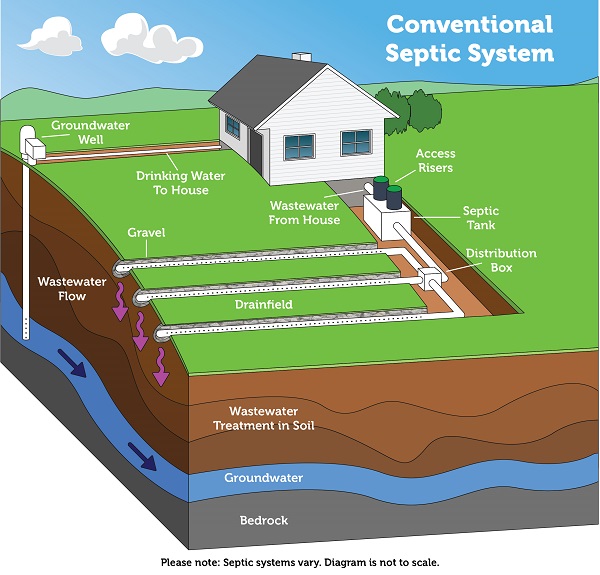If you are not connected to a centralized sewer service, you probably have an onsite sewage disposal system, otherwise known as a septic system. A typical septic system consists of a septic tank and a drainfield/soil absorption field or leach field.
The septic tank digests organic matter and separates floatable matter (e.g., fats, oils, and grease) and solids from the wastewater. Soil-based systems discharge the liquid (known as effluent) from the septic tank into a series of perforated pipes buried in a leach field, chambers, or other special units designed to slowly release the effluent into the soil.
Alternative types of systems use pumps or gravity to help septic tank effluent trickle through sand or other media to remove or neutralize pollutants like disease-causing pathogens, nitrogen, phosphorus, and other contaminants. Some alternative systems are designed to evaporate wastewater or disinfect it before it is discharged to the soil. (Source: EPA How Septic Systems Work)

With proper, regular maintenance, a septic system could last as long as thirty years or more. Here is what you need to know to get the maximum life out of your septic system:
- Don’t ignore your septic system! Inspect and pump your system regularly. Have your system inspected and pumped every three to five years, depending on usage.
- Don’t bury the septic system covers.
- Don’t drive over or plant vegetation with large root systems on your leach field. If you need assistance locating your leach field, contact your local health department. In Steuben County, Indiana, call the Health Department at (260) 668-1000, ext. 1500 or visit their webpage by clicking here.
- Use water efficiently. Try to spread water usage throughout the day. Use high efficiency toilets, aerators on sinks, and select the proper washing level for each load of laundry that you wash. Spread laundry through the week instead of washing it all on a single day.
- Remember that septic systems are not trash cans! The only things that should go into the septic system are water, toilet paper, and human waste. Avoid flushing wipes or cigarette butts or using bath bombs.
For more information, see the Steuben County SWCD’s Septic System Maintenance Information. You can also visit the US EPA’s How to Care For Your Septic System.